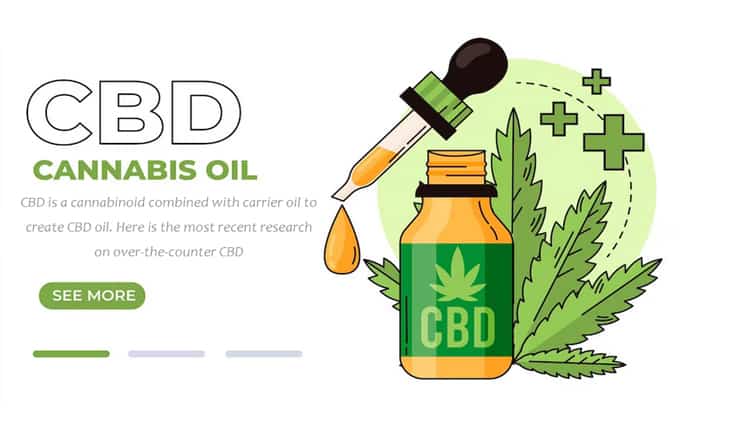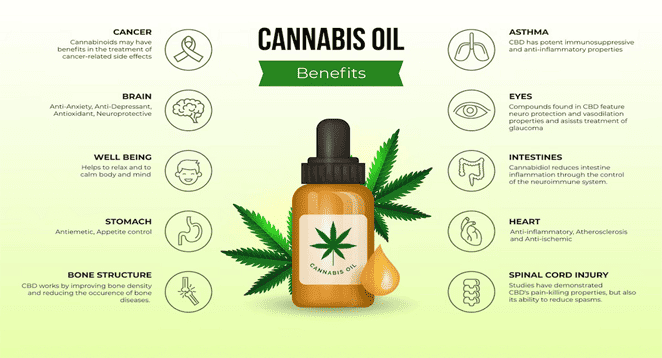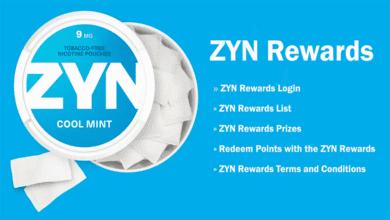
Cannabis Benefits, Products, Medications & Side Effects: CBD is a cannabinoid combined with carrier oil to create CBD oil. Cannabinoids regulate anxiety, temperament, and metabolism by interacting with the endocannabinoid system. CBD is derived from cannabis plants, including Cannabis indica, Cannabis sativa, and Cannabis ruderalis. Regardless, the CBD of the hemp plant (Cannabis ruderalis) is typically higher.
THC (delta-9-tetrahydrocannabinol) is the other major component of Cannabis indica and Cannabis sativa, but not typically Cannabis ruderalis.
THC can induce euphoria but can also cause other sensations, such as paranoia. CBD oil should have no more than 0.3% THC, so it typically does not induce euphoria; however, it may not be safe, particularly for specific populations.
Researchers and consumers are curious about CBD products. According to one source, the products may earn over $20 billion in the United States alone by 2024. CBD has been examined as a treatment for epilepsy, chronic pain, anxiety, and inflammation, among other conditions. However, various levels of scientific evidence support these claims, so it is unclear whether CBD is effective for these conditions.
Note: CBD oil and hemp oil are distinct. Hemp oil is produced differently (by processing hemp seeds) and typically does not contain CBD.
Here is the most recent research on over-the-counter CBD, including its applications, interactions, and things to remember if you decide to try it.
Product Specifics
Cannabidiol is the active ingredient(s) in the product.
Cannabis, Cannabis ruderalis extract, and hemp plant extract are alternative names.
The prescription substance (Epidiolex) is lawful in most states, but the FDA does not consider it a dietary supplement (FD&C Act).
Dosage recommendations vary by condition. CBD is not intended for disease prevention, treatment, or cure.
Contraindicated during pregnancy and breastfeeding; not recommended for use in minors; interacts with alcohol and numerous prescription medications.
Benefits of Using CBD Oil
A healthcare specialist, such as a registered dietitian, pharmacist, or healthcare provider, should evaluate and approve supplement use individually. No dietary supplement is intended to cure, prevent, or treat disease.
Proponents of CBD oil assert that it benefits a variety of health conditions. As CBD’s popularity has grown, scientists have endeavored to conduct more research on it, but human trials still need to be undertaken. Few scientific studies support its numerous health claims.
Here are some of the more compelling health benefits of CBD oil.
Seizures
The FDA approved Epidiolex, a CBD oral solution. However, Epidiolex is not an over-the-counter (OTC) medication.
Epidiolex treats Dravet syndrome and Lennox-Gastaut syndrome in infants younger than two years old. In the first year of life, these rare genetic disorders induce enduring epileptic seizures.
In 2020, it was also approved for treating tuberous sclerosis complex, a rare hereditary disorder that causes benign lesions to develop throughout the body and is frequently accompanied by seizures. Epidiolex is approved for treating all three conditions in one year and older patients.
In addition to these three conditions, the efficacy of CBD in treating seizures is unknown. Even with Epidiolex, whether CBD or another factor is responsible for the anticonvulsant effects is uncertain.
Remember that Epidiolex is not a dietary supplement. A healthcare professional must prescribe it. In contrast, CBD products are neither regulated nor standardized. And they have not demonstrated efficacy in treating seizures to date.
Anxiety
CBD may aid in treating anxiety disorders, although human trials examining CBD’s anxiety-relieving effects are limited.
In one study, men were given either CBD oil or a sugar supplement containing no CBD (placebo) before public speaking. Blood pressure or heart rate measurements were used to evaluate the participants’ anxiety levels. In addition, the researchers used the Visual Analog Mood Scale, a reliable measure for assessing emotional states.
Men who received 300 milligrams of CBD oil reported less anxiety than those who received a placebo; however, men who received 100 or 600 milligrams of CBD oil did not experience the same effects.
Unfortunately, this trial was limited by a small sample size and only enrolled men, so additional information is required to determine whether CBD has the same effect on women.
CBD reduced symptoms of Social Anxiety Disorder in adolescents in a second double-blind, placebo-controlled study (meaning neither the participants nor the researchers knew who received CBD and who received a placebo). This study was well-designed, but it involved only 37 individuals.
Addiction
Initial research on CBD’s effects on addiction has produced contradictory results.
CBD at 400 and 800 milligrams was beneficial in a small randomized controlled trial involving fifty individuals with heroin use disorder. Those who received CBD instead of a placebo (a sugar supplement) exhibited less anxiety and fewer heroin cravings. However, more research is needed to define the safety and efficacy of CBD oil for this application.
Schizophrenia
In a randomized, controlled trial involving 88 individuals already taking medication for schizophrenia, 1,000 milligrams per day of CBD oil reduced positive psychotic symptoms (hallucinations or delusions). However, there were no statistically important differences between CBD oil and placebo regarding negative psychotic symptoms (such as apathy or lack of interest in others).
Also note that CBD oil was examined in this trial as an add-on therapy, as participants were already taking prescription medications to treat schizophrenia.
Actual THC products may exacerbate psychosis, schizophrenia, and paranoia symptoms.
Placebo Effect May Play a Role in CBD’s Efficacy, According to a Study
CBD for Epilepsy
Despite the preliminary nature of the data, CBD oil has also been investigated for the following conditions, albeit with scant evidence of benefit:
- Acne
- Arthritis
- Spectrum disorder Autism
- Chronic ache
- Depression
- Digestive disorders
- High blood pressure
- Insomnia
- Parkinson’s illness
Conditions of the skin, such as dermatitis and psoriasis
Most of these analyses were conducted on animal subjects, so comparable results in humans may or may not be observed. Therefore, there is insufficient data to recommend CBD oil for these applications.
CBD Oil vs. Marijuana
CBD Oil
- A constituent of the cannabis plant.
- Absence or minimal quantities of THC (less than 0.3%).
- It works on receptors in the brain but not those that induce psychoactive effects (such as opioid receptors, which aid in pain control, or glycine receptors, which influence mood control).
Marijuana
- Cannabis is a distinct member of the cannabis genus that contains CBD and hundreds of other compounds.
- a substantial quantity of THC
- THC binds to brain cannabinoid receptors to produce a “high” sensation.
What Side Effects Does CBD Oil Have?
Clinical studies have demonstrated that CBD oil can have adverse effects. In one study, 91 percent of persons with seizure disorders who took the prescription medication Epidiolex experienced adverse effects. The specific adverse effects and severity differ from individual to individual and CBD product to CBD product.
Frequent Side Effects
The most frequently reported adverse effects of CBD oil include the following:
- Change in hunger
- Somnolence or lethargy
- Diarrhea
- Change in liver enzymes
- Severe Side Effects
People with treatment-resistant epilepsy (recurrent seizures despite taking multiple medications) have been reported to experience severe adverse effects. These consist of the following:
Status epilepticus (a life-threatening medical emergency in which a seizure lasts longer than five minutes) is a condition in which an attack lasts longer than five minutes.
Pneumonia (infection of the lungs’ air sacs)
Consider also that CBD products are unregulated and may be adulterated or mislabeled. E.g., one study found that 21% of CBD products sold online contained THC.30 Some of the severe adverse effects of THC, especially at concentrations above 2.4 milligrams, are as follows:
Anxiety
- Cognitive impairment (lower IQ scores and memory loss).
- Psychosis, which includes paranoia, emotional withdrawal, and hallucinations.
- If you experience these adverse effects while using CBD oil, discontinue use immediately and consult your healthcare provider.
- THC increases the risk of psychological disorders in adolescents. These psychological disorders are associated with a higher likelihood of psychosis and schizophrenia.
- Do not drive or operate heavy machinery while taking CBD oil, particularly when beginning use or switching brands. Remember that some products do contain trace quantities of THC.
Precautions
Your physician may advise you against using CBD oil if you:
- CBD oil may increase liver enzymes, a marker of liver inflammation, in patients with liver disease. Consult your healthcare provider before consuming CBD oil. You may need to monitor your liver enzymes frequently if you use CBD.
- CBD oil may also induce eye-related adverse effects if you have ocular problems. For example, a 2018 study found that it may increase intraocular pressure. For those with glaucoma, this can aggravate the condition. Additionally, some individuals report fatigued eyes as an adverse effect of CBD oil.
- If you are pregnant or breastfeeding, you should avoid using CBD oil. CBD does cross the placenta, although its effects are not entirely understood. Further, the American Academy of Pediatrics (AAP) advises pregnant women not to use marijuana products due to the potential dangers to developing fetuses.
- Combining CBD with alcohol or other sedative medications may result in excessive lethargy.
- Children should not consume CBD oil.
How Much CBD Oil Should I Consume?
You should consult a physician before taking a supplement to ensure the supplement and dosage are appropriate for your requirements.
There are no guidelines for CBD products or “correct” CBD oil dosage. CBD has been administered in quantities between 40 and 1,280 milligrams per day. In one study, patients admitted to the emergency room with acute back pain were administered 400 milligrams of CBD oil as a single dose.
In a separate study, schizophrenic patients received 600 milligrams of CBD oil daily for six weeks. As a general rule, you should never exceed the recommended dosage.
What Happens If Too Much CBD Is Consumed?
- Adults appear to tolerate doses of up to 1,500 milligrams per day without adverse effects. Watch for severe adverse effects such as fatigue, appetite changes, seizures, and pneumonia. Consider that CBD may be degraded and contain unlisted ingredients, such as THC, and may not have CBD listed on the bottle.
- Children can be particularly susceptible. For example, children unintentionally ingested excessive CBD oil exhibited dangerously delayed respiration.
- CBD is also present in various foods and beverages in the United States; if you intend to consume these, you should discuss your daily dose with a healthcare professional.
If you have any questions about using or accidentally ingesting CBD products, please contact your healthcare provider, health department, or local or regional Poison Control Center at 1-800-222-1222. Dial 911 in the event of an emergency.
Interactions
CBD oil can interact with medications, including numerous epilepsy medications. One of the reasons for this is how your body metabolizes (breaks down) substances.
Cytochrome P450 (CYP450) is an enzyme the liver uses to break down certain substances. CBD oil is degraded by CYP450, which can also be affected by it. Therefore, combining CBD oil with these medications could produce a more potent effect than necessary or reduce their effectiveness.
The following medications may interact with CBD:
- Anticonvulsants like phenobarbital, Lamictal (lamotrigine), Onfi (clobazam), Dilantin (phenytoin), Tegretol (carbamazepine) and Trileptal (oxcarbazepine). In general, these will reduce the concentration of CBD. CBD raises lamotrigine concentrations.
- Antidepressants like Paxil (paroxetine), Celexa (citalopram), Remeron (mirtazapine), and Tofranil (imipramine). CBD may increase these medications’ concentrations and exacerbate their adverse effects.
- Antifungals like ketoconazole
- Antipsychotics such as Haldol (haloperidol) are used to treat schizophrenia.
- Benzodiazepine sedatives like Klonopin (clonazepam), Ativan (lorazepam), and Valium (diazepam). CBD reduces the effect of clonazepam and enhances the effect of others, which may increase adverse effects such as lethargy.
Echinacea species
- Erectile dysfunction medicines like Viagra (sildenafil)
- Immune-suppressants like Sandimmune (cyclosporine). CBD may increase drug concentrations.
- Macrolide antimicrobials such as clarithromycin
- Opioid analgesics like morphine. CBD augments the effectiveness of morphine.
Medications containing rifampin are used to treat tuberculosis
- Statins, such as Lipitor (atorvastatin) and Zocor (simvastatin), are used to treat cholesterol.
Always inform your healthcare provider and pharmacist of all your prescribed, over-the-counter, herbal, or recreational medications. Alcohol or other drowsiness-inducing recreational substances may enhance the side effects of CBD oil.
It may not be necessary to alter your treatment if the interactions between these medications and CBD are minimal. Sometimes, you may need to switch medications or space out your doses to avoid a reaction. Never alter or discontinue your medication without first consulting your doctor.
It is crucial to carefully peruse a product’s ingredient list and nutrition facts panel to determine which ingredients are present and in what quantity. In addition, please consult this supplement’s label with your doctor to discuss possible interactions with foods, other supplements, and medications.
How to keep CBD Oil
Keep CBD oil in a dry, dark location. Refrigeration may help it remain stable for a more extended time. Discard Epidiolex 12 weeks after the bottle has been opened. Toss after one year or per the instructions on the packaging.
Keep this medication and all others out of the reach of children and animals.
Comparable Products
Other cannabinoids isolated from the cannabis plant are beginning to appear in dispensaries and pharmacies, including:
- CBC (cannabichromene)
- CBDV (cannabidivarin)
- CBG (cannabigerol), promoted as a treatment for digestive disorders
- CBN (cannabinol)
There is very little evidence to support the use of these products. Additional research is required to elucidate their safety and efficacy.
Non-cannabinoid supplements that act similarly include:
- Palmitoylethanolamide (PEA): Targets comparable pathways as CBD and may reduce inflammation44.
- Echinacea: This may be helpful for agitation.
- Kava may help with anxiety and sleep by acting on the endocannabinoid system.
- Valerian
- Passionflower
- German marigold
- L-theanine
- Magnesium
- Melatonin
FAQ
Is one form of CBD oil superior to another?
CBD oil is available in various forms:
- CBD isolates only contain CBD.
- Broad-spectrum oils contain almost all plant components (such as proteins, flavonoids, terpenes, and chlorophyll) but not THC.
- Full-spectrum cannabis oils contain every component, including THC (up to 0.3%).
Some medical professionals believe that the compounds provide additional health benefits, but insufficient evidence supports these claims.
CBD oil and hemp oil: are they identical?
Perhaps not necessarily. Although the terms are sometimes used interchangeably, hemp oil can also refer to hemp seed oil, which is used in cuisine, the production of food, and cosmetics. The leaves, stems, blooms and flowers of the Cannabis indica or Cannabis sativa plant produce CBD oil. Therefore, it should contain 0.3% or less THC. Hemp oil is made from Cannabis sativa seeds and does not contain TCH.
CBD oil: Is it possible to overdose?
Yes. CBD oil overdose is conceivable, particularly in minors. Children who ingested CBD oil unintentionally exhibited dangerously delayed respiration. However, it is essential to note that many CBD products have also been discovered to contain THC, which, when consumed in high quantities, poses risks such as heightened anxiety.
Can I purchase CBD oil in every U.S. state? Is interstate travel permissible with it?
The legality of purchasing and distributing CBD is highly ambiguous. However, in 2018, it became legal to sell CBD oil derived from the hemp plant that contains less than 0.3% THC, so long as it is not marketed as a dietary supplement or a treatment for medical conditions.
Most states now permit the sale of CBD with trace amounts of THC, although it remains unlawful in some.
Before traveling, consult State Medical Cannabis Laws from the National Conference of State Legislatures for state-specific regulations. For example, some states prohibit the importation of CBD from other states.
How can I ensure that the item I purchase is of high quality?
Choose products with a certificate of analysis (COA) from an independent lab or companies certified for current Good Manufacturing Practices (cGMP). The COA certifies that the product has been analyzed for CBD and THC concentrations and potential contaminants. CBD is derived from a plant and is vulnerable to pesticide compounds.
Ensure that the facility producing the product complies with ISO 17025, demonstrating that high scientific standards are met. In addition, the FDA has issued multiple levels of warning to companies whose products are mislabeled or adulterated (they contain potentially hazardous ingredients that can make you ill). Examine them here and avoid purchasing them.
Can CBD use result in a positive drug test?
Studies indicate that unadulterated CBD will not result in a positive urine drug test, as these tests are designed to detect THC. However, CBD products containing THC, such as full-spectrum oils, may result in positive drug tests.
CBD oil: Is it harmless for pets?
Not enough is known regarding the use of CBD in animals. Always consult your veterinarian before administering CBD to your companion. In addition, the FDA recommends keeping a watch out for drowsiness, depression, excessive saliva, vomiting, agitation, tremors, and convulsions.
Can CBD oil cause intoxication?
As previously stated, CBD oil is derived from a plant (typically hemp, Cannabis ruderalis). Hemp belongs to the same plant family as marijuana. However, CBD oil naturally does not induce the exaltation that can make a person feel “high.”
Because it does not contain sufficient tetrahydrocannabinol (THC), THC induces euphoria and other possible emotions, such as paranoia.
Where to Find CBD Oil and What to Search For
CBD can be derived from two types of cannabis plants: marijuana, which contains a high concentration of THC, and hemp, which contains a low concentration of THC.5 Since 2018, the FDA has allowed CBD products to be sold as long as they contain less than 0.3% THC.[cite] However, the FDA has prohibited companies from marketing CBD as dietary supplements or claiming that they treat specific conditions.
Keep in mind that CBD medicines are not regulated. Therefore, there is no assurance that a product is what its packaging purports it to be. Also, you cannot be confident that it is safe and effective.
A 2017 study found that only 31% of online-sold CBD products were correctly labeled. In addition, the majority contained less CBD than advertised, and 21% had significant THC quantities.
CBD Oil Sources in Food
Adding CBD oil to food or beverages is illegal due to the availability of an approved prescription product (Epidiolex for epilepsy). Nevertheless, despite FDA warnings, CBD oil has been added to many foods and beverages, including coffee, chocolate, and carbonated water.
It is believed that CBD is best assimilated when consumed with a high-fat meal. CBD is lipophilic, which means it dissolves optimally in fat.
CBD Oil Medications
Various forms of CBD are available, including:
Tinctures (mixtures of CBD oil and a base oil)
- Capsules
- Tablets
- Gummies
- Sprays
- Creams
- Gels
- Inhalation liquids (vape pens)
Suppositories
Your personal preferences and desired effects predominantly determine the product you select. In addition, the body’s rate of absorbing the oil depends on how it is administered. For instance, CBD begins to work within five minutes when vaped, compared to up to an hour when consumed orally.
As a result of secondhand exposure to contaminants, note that vaping is detrimental to both your body and those around you who are exposed to your vapor.
It is essential to observe the instructions and make healthful choices, as the form of each product affects its effectiveness.
Summary
The FDA does not regulate CBD oil, and contrary to prevalent belief, it does carry some hazards.
It is essential to remember that CBD oil may not live up to the hoopla and could even be harmful until more research is conducted. In addition, CBD products have not demonstrated significant efficacy for most advertised conditions.
There is substantial variation in the products available at dispensaries, tobacco stores, and online. Each product may contain significantly different concentrations of CBD or THC than what is listed on the label and hazardous additives.
Always consult your healthcare provider before using CBD oil to ensure it does not interact with your prescription medications. In addition, CBD should not be administered during pregnancy, lactation, or to minors.




